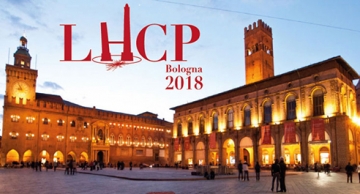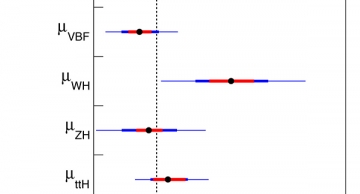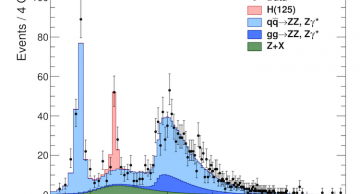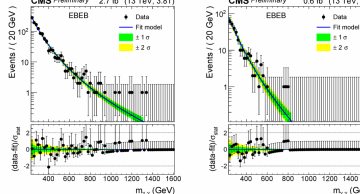Do you remember where you were on July 4th, 2012? If you are an American, perhaps it's not so difficult to recall that day. You might have been enjoying a barbecue with your friends and family to celebrate the national Independence Day. For others,…
News
|
Anonymous |
Physics
|
Anonymous |
Physics
The CMS collaboration continues with its rich harvesting of the large Run 2 dataset with 21 new results presented at the LHCP 2018 conference in Bologna, Italy. The results cover a wide assortment of topics and range from precision measurements of…
|
Anonymous |
Physics
The first observation of the simultaneous production of a Higgs boson with a top quark-antiquark pair is being published today in the journal Physical Review Letters (PRL). This major milestone, first reported by the CMS Collaboration in early April…
|
Anonymous |
Physics
The CMS collaboration came to this year’s Quark Matter conference with fourteen new results, never shown before, and five other results recently submitted for publication. The majority of them exploit the high luminosity 8.16 TeV pPb, and 5.02 TeV…
|
petrilli |
Physics
Observation of ttH production
The observation of a Higgs boson in 2012 at the Large Hadron Collider marked the starting point of a broad experimental program to determine the properties of the newly discovered particle. In the standard model…
|
Anonymous |
Physics
Analysis of the large dataset delivered by the LHC in Run 2 continues with more than 25 new results from the CMS collaboration presented at the 2018 Rencontres de Moriond conference. Most of these results will be published shortly and will add to…
|
achintya |
Physics
It has been a little over seven (and a half) years since the LHC started delivering collisions to CMS for physics analysis, and just a few days ago we published our 700th research paper. To celebrate this achievement, we thought we would give you a…
|
achintya |
Physics
12 October 2017
For most of each operational year, the Large Hadron Collider (LHC) typically smashes protons together to generate vast amounts of data for physicists to analyse. These proton-proton (pp) collisions were responsible, for example, for…
|
lapka |
Physics
The 10th International workshop on top quark physics, TOP2017, was held in Braga, Portugal, from September 17th to 22nd, 2017 and brought together a number of experimentalists and theorists from all over the world. The CMS Collaboration presented…
|
petrilli |
Physics
Harvesting of the large 13 TeV data set delivered by the LHC in 2016 and collected with the CMS detector continues, with 20 new results to be presented at the EPS 2017 conference, adding to the more than 60 results already presented at the 2017…
|
petrilli |
Physics
The exploitation of the LHC data collected by CMS is continuing successfully, with more than 35 new results presented at the Moriond 2017 conference, most of which used the full 2016 luminosity. These results cover all the research lines of the…
|
cmspeopl |
Physics
The Rencontres de Moriond – Electroweak (Moriond EW) takes place this week in La Thuile, Aosta Valley, Italy, where the CMS Collaboration will present more than 30 new results approved since the December 15 seminar at CERN. First measurements of the…





